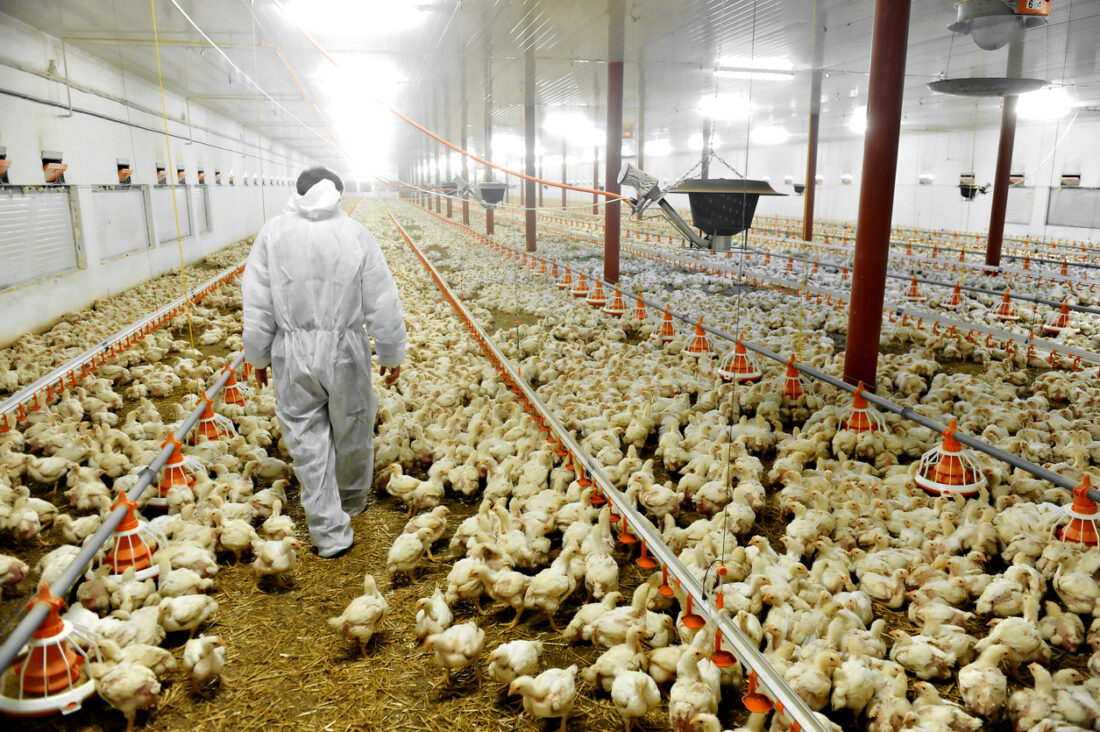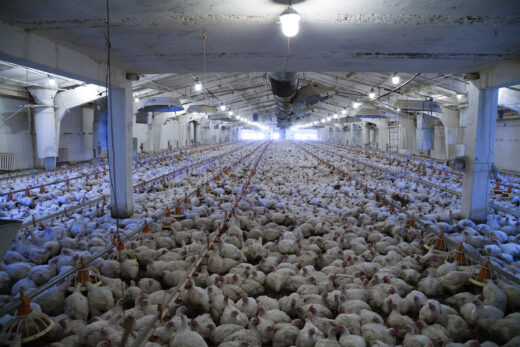
Why We Don’t Wait on Corporate Ag Promises
By Kelsey Eberly
Senior Staff Attorney
“What happened to antibiotic-free chicken?”
So asked a recent article examining the unfortunate but predictable arc of a years-long campaign to get excessive antibiotics out of chicken feed. For decades, global public health leaders have been sounding the alarm on the overuse of antibiotics, including in agriculture. Yet the chicken industry has for years gobbled up massive quantities of the drugs with impunity — even ones we use to treat and prevent human infections, from UTIs to surgeries.
Why? Because the industry’s ruthless drive for profit and “efficiency” has relegated chickens to such dirty, overcrowded, and stressful living conditions that the birds get sick and die en masse if they don’t regularly consume low doses of antibiotics in their feed or water. This corporate dependence on antibiotics helped drive the emergence of lethal antibiotic-resistant “superbugs” and rendered antibiotics widely used in human medicine ever less effective, threatening farmworker safety and public health globally.
If that’s not indicative of a broken food system, I don’t know what is.
After anemic efforts by industry-captured regulators, in the 2010s public health advocates secured a series of major commitments by big meat companies and food service providers to modify their use of antibiotics — or even quit the drugs altogether. It seemed like a win-win: chicken giants like Tyson, Perdue, and Foster Farms capitalized on growing consumer affinity for meat from animals raised without antibiotics, and were praised for (supposedly) taking bold action for public health.
Yet like so many corporate “commitments” — industry promises to phase out intensive confinement of farmed animals or to slash greenhouse gas emissions, for example — they were a house of cards from the start.
First, chicken companies removed antibiotics without significantly changing the miserable conditions in which the animals live, ensuring the suffering and deaths of millions of birds. As a Tyson executive later put it in an anodyne presentation to investors, after removing antibiotics the company was seeing significant problems with “livability.”
And the removal of antibiotics from chicken feed did nothing to meaningfully disrupt or dismantle the consolidated, extractive, punishing system of corporate agriculture.
At FarmSTAND, we know that when Big Ag makes promises and announces commitments, 99% of the time it’s just corporate image-laundering — an effort to ease the public exposure and pressure from activists’ or consumers’ campaigns or to dissuade regulators from cracking down. A few years on, there’s little to stop companies from reneging on their lofty “commitments.”
As the journalist covering the death of “antibiotic-free” chicken put it: “When the rubber meets the road in achieving capitalism’s goal of maximizing profits, shareholders may prioritize cost savings, especially after consumer attention on any given issue has waned over time.”
That’s why we see and do things differently. FarmSTAND doesn’t ask Big Ag companies to make promises. We sue them for misleading the public and breaking those promises. We believe transformative change comes not from boardrooms, but courtrooms and communities.
When Hormel lied about its factory farmed products being “all natural,” we sued and exposed the truth about their practices as well as their efforts to mislead consumers. At the height of the COVID-19 pandemic, when Smithfield lied about the safety of its slaughterhouses and JBS, too, was playing Russian roulette with its workers’ health, we sued to hold them accountable.
When massive mega-dairies made a community’s water undrinkable, we didn’t ask for a corporate commitment: we threatened legal action and secured a settlement to clean up the pollution. We stand at the ready to jump in again if companies don’t follow judicial orders or abide by settlements.
When workers and communities secure hard-won legislative and regulatory gains curbing some of Big Ag’s abuses, and industry sues to invalidate those gains, we step in to defend them. Big Ag wants to stop farmworkers from having access to basic services. They want to thwart slaughterhouse workers from having a trusted ally present during federal occupational safety inspections. And they’re trying to bar communities from preventing illegal mega-dairy expansions. But we won’t let them do that—not without a fight.
There can be a role for corporate campaigning. But with all carrots and no sticks, we’ll always be fighting a losing battle. We don’t have to rely on corporate promises. We shouldn’t, and we won’t. Until we secure a food system that nourishes our communities, that recognizes the dignity of work, and that cares for animals, waterways, and the climate—the food system we all deserve—FarmSTAND will be bringing the fight to Big Ag.

